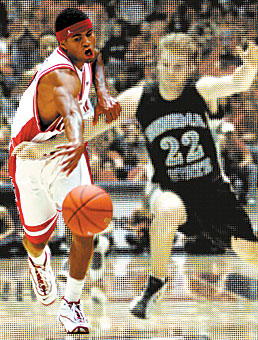 |
|
SAUL LOEB/Arizona Daily Wildcat
|
UA junior guard Chris Rodgers may not crack the starting lineup too often, but his presence on the court and the bench for the Wildcats is immeasurable. Rodgers offers relief to starters Salim Stoudamire and Mustafa Shakur when necessary.
|
|
|
By Roman Veytsman
Arizona Daily Wildcat
Friday, November 19, 2004
Print this
Last year's loss to Seton Hall in the first round of the NCAA tournament is still ingrained in the minds of the remaining players of the UA men's basketball team.
The Wildcats shot 53 percent from the field in that game, while the Pirates shot just 47 percent, and the UA hit 15-of-19 from the free throw line, after leading the Pacific 10 Conference in that category throughout the season.
So what actually happened?
The Pirates overcame a 14-point lead in the second half to win 80-76, sending Arizona out in the first round for the first time in the last five seasons.
The true answer wasn't just a Seton Hall barrage, but rather a lack of depth that plagued the Wildcats all season long.
An injury to junior power forward Isaiah Fox in the season's second regular-season game derailed any help for Channing Frye down low.
Frye played 38 minutes in the tournament loss, and although he scored 13 points and grabbed 12 rebounds, he shot only 6-of-16 from the floor.
Bench Brawlers |
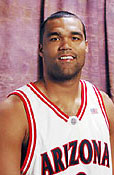
| 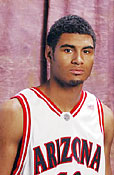
| 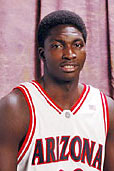
|
| Isaiah Fox | Chris Rodgers | Mohammed Tangara |
"Channing, at the end of the year, couldn't have been as aggressive as he wanted because he couldn't get in foul trouble," said sophomore forward Kirk Walters.
Big man Dennis Latimore and guard Will Bynum could have helped the Wildcats, but both transferred to other schools prior to last season. Another big man, Chris Dunn, was ruled academically ineligible and didn't suit up last year for the UA.
In fact, the starters, minus Hassan Adams, all played over 36 minutes in the tournament loss. The only player off the bench to contribute was guard Chris Rodgers, who played 19 minutes. The other two bench players to play in the game were Ivan Radenovic and little-used guard Jason Ranne, who played just five minutes combined.
Seton Hall used a 23-5 run in the second half to take the lead against a team that was exhausted and couldn't get a second wind. Arizona wasn't able to use its vaunted pressure defense effectively and couldn't run the Pirates out of the gym.
"We ran a lot even though we had about seven guys last year," said point guard Mustafa Shakur. "We ran a whole lot but we didn't press as much."
Shakur, who played 38 minutes in the game, won't have to worry about getting tired this year. The Wildcats received help in the form of five freshman and the return of Fox.
"We have so much depth and people can keep subbing in, and the guards like Hassan and Mustafa won't get tired at the end of the game," said freshman guard Daniel Dillon.
The Wildcats may be able to go 10-deep this year, with the bench consisting of Dillon, Rodgers, freshman guards Jesus Verdejo and Jawann McClellan, and freshman forward Mohamed Tangara.
"Having star players in their own right, such as Jesus, Jawann, Mohammed, and Daniel, who are tough and play so hard in practice, that you have to bring your game every day in practice or you're going to look bad," Shakur said.
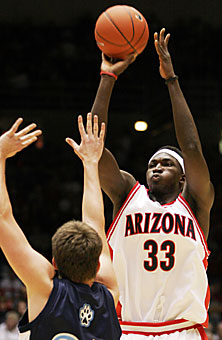 |
|
SAUL LOEB/Arizona Daily Wildcat
|
UA freshman forward Mohamed Tangara should join forces with junior Isaiah Fox and sophomore Ivan Radenovic to form a most formidable trio at power-forward for the Wildcats this season.
|
|
|
A competitive environment in practice can make all the difference. Depth is not only important during games, but can be used to create more realistic practice situations, in order to prepare for athletic teams.
"It makes every player more hungry and work harder because you're not going to get anything easy in practice," Shakur said of the newfound depth. "Last year, a lot of the guards were going against Fil Torres and Jason Ranne, and no disrespect to them, but it didn't really help Andre and Hassan."
The Seton Hall game was not the only game that showed off the lack of depth. Both games against Stanford showed the Wildcats' flaw, as the Cardinal ran guys off their bench and outlasted Arizona.
"I saw the Stanford game on my visit and I saw that there was not much depth at all," Dillon said.
This year, depth as well as the improvement of the returnees should help the Wildcats.
"This year we have depth and senior leadership at every position," Olson said. "I think this team could be really, really good."
